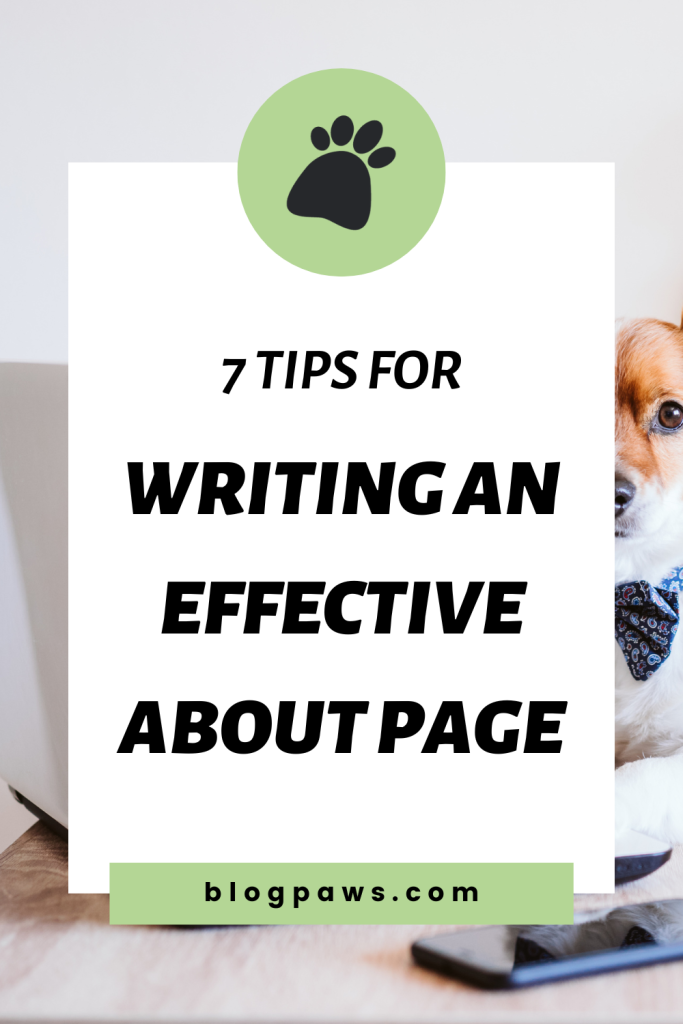7 Tips for Writing an Effective About Page
Have you ever found that writing your own about page is a recipe for writer’s block? What should you include? What’s important to your readers? How do you include that while keeping SEO in mind?
If you have pondered these questions, you’re not alone. While we don’t believe there is a specific formula for writing your about page, we do believe that there are things you should do and things you shouldn’t do.
The biggest should for anyone looking to freshen their existing page up is to think about who it’s written for. Who is your audience that will be landing on your website and looking to learn more about you when they click that about me button?
What is the Purpose of an About Page?
The purpose of your about page is:
- Your audience wanting to know you better;
- wanting to feel like they can trust your content; and
- wanting to feel like they can relate to you.
If you have a readership audience and a client-based audience, you should have two separate about pages. The things that each of these audiences care about are different. When writing a page for those who want to pay you to work for them, this information is usually included on a media page or a services page.
Your actual about page should be written for the audience digesting your content. Even Google agrees with their latest update prioritizing “people first content.”
It’s a rare occurrence for someone to land on your about page as the first page that they visit. Usually, they find other content on your website and they go to the about page to learn more about you.
It’s up to you to give them the information that makes them feel like you are trustworthy, knowledgeable, and someone they can learn from. Or be entertained by. Or “insert relative adjective here”. Whatever content you create, your about page should show why you are the person to get that content from.
How to Write An Effective About Page
You’ve probably seen short about pages, long about pages, about pages with tons of photos, about pages with no photos, and everything in between. It leaves most people wondering how to actually write an effective one.
We get it. And the bad news is, depending on your audience and your content, you can and should lead with different things.
The good news is that there are some basic Do’s and Don’ts that can help you no matter how you craft your about page. Here are 7 tips that you should take into consideration when you are first writing yours or giving it a refresh.
Five Do’s for Writing Your About Page:
- Do be sure to answer the main questions:
- What do you believe?
- Why do you believe it?
- What did those beliefs lead you to do? Get a certification, a degree, or another form of education? Life experience counts here too but describe it.
- What can a reader expect from you (and your content)?
- Do get specific.
- Use numbers when they support your expertise. Instead of saying, “a long time,” tell us exactly how long.
- Use titles and designations or qualifying statements. Saying, “I’ve raised cats for 20 years” is better than saying, “I’ve raised cats my whole life.”
- Do share any awards or recognitions you have received. Be selective though. If you have a really long list, pick the top and best accomplishments for your about page.
- Do display or mention professional memberships. Some memberships have a digital badge that you can display and link out to. That is something you can put at the bottom of your about page, if you choose. TIP: if you can link out to a membership profile page of yourself, that is better than the homepage of the membership.
- Do share social proof, as long as it’s relevant. Selling 10k of a product, like a photo you took, is relevant. Having 10k likes on a photo, most likely, is not relevant to your expertise. It might be if your expertise is on how to get 10k likes on a photo though.
Two Don’ts for Writing Your About Page:
- Don’t write your biography. While an about page has some biographical events on it, it’s more than just a chronological list of what you’ve done in your life.
- Don’t write a short story as though your about page is an essay entry into a writing contest. You need to mix your story and your biography on your about page to include the relevant information in the Do section.
What is the Difference Between An About Page and a Bio?
Speaking of a website bio, it’s not always clear what the difference is between an about page and a bio. Both do have some similar information, but the biggest difference is their purpose; and thus, how they are written.
Bio is short for biography, which is a real account of the events of your life. Most of us aren’t well-known enough to share our biographies and have people care. That’s why most bookstores only sell biographies of famous people or people who have led such fantastical lives that the rest of us can’t even fathom being that person.
When it comes to writing your about page, you need to bring together your website bio and your personal beliefs and stories. You pull from both the historical events of your life – the relevant ones – and the stories of who you are. Together those become an about page on your website.
About Page Examples and Why We Love Them
Check out Lola the Rescued Cat’s about page. We love how she leads with her story. It suits her content for the following reason:
- The site is written from Lola’s point of view, mostly.
- The site is heavily focused on advocacy, which Lola’s story is very relevant for.
- She weaved in her book, her awards, and her beliefs.
Another great about page example is over on Kol’s Notes. Author, Jodi, knows her audience and built her about page with them in mind.
- She puts her photo right at the top, and as a recipe blogger helps her audience SEE her right away.
- She uses cute memes to have a conversation with her audience.
- She shares all the important things you want to know about what you can get from her content (recipes) at the top. Then, she goes into her rescue dog that inspired the blog. Felix is important, too, but he’s not why people are coming to the blog so her choice to start with the recipes is a good one.
Finally, one of the best about page examples for those of you who have product businesses is Wag Worthy Naturals. Founder Jane has a company and a personal mission that must be present on her about page. She does a great job by:
- Leading with the company’s mission so readers can decide right away if that is something they align with or not.
- Introduces herself next, allowing readers to learn more about the person behind the brand.
- Weaving in her background to support the development of her product, which is essential with health products.
Your about page may not be a well-trafficked page on your website, but it’s an important page for your readers and for Google.
As Google puts more and more emphasis on E-A-T – Expertise, Authority, and Trust – your about page becomes a place where you get to make your case for your readers and for Google that you know what you are talking about.
Go give your about page a read with these Do’s and Don’ts and come back and let us know what you updated.
About the Author: Chloe DiVita, BlogPaws CEO, has 15+ years of experience in digital marketing, the pet industry, and as a greyhound mom. She’s earned accolades like, Pet Age’s 40 Under 40 and Muse Medallions from the Cat Writers’ Association. Formerly Executive Producer for TEDxCambridge, she brings storytelling and public speaking to her work with creators, leaders, and brands. Read more…



